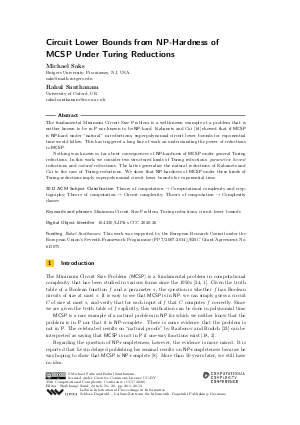Circuit Lower Bounds from NP-Hardness of MCSP Under Turing Reductions
Authors Michael Saks, Rahul Santhanam
-
Part of:
Volume:
35th Computational Complexity Conference (CCC 2020)
Part of: Series: Leibniz International Proceedings in Informatics (LIPIcs)
Part of: Conference: Computational Complexity Conference (CCC) - License:
 Creative Commons Attribution 3.0 Unported license
Creative Commons Attribution 3.0 Unported license
- Publication Date: 2020-07-17
File

PDF
LIPIcs.CCC.2020.26.pdf
- Filesize: 437 kB
- 13 pages
Document Identifiers
Subject Classification
ACM Subject Classification
- Theory of computation → Computational complexity and cryptography
- Theory of computation → Circuit complexity
- Theory of computation → Complexity classes
Keywords
- Minimum Circuit Size Problem
- Turing reductions
- circuit lower bounds
Metrics
- Access Statistics
-
Total Accesses (updated on a weekly basis)
0Document
0Metadata
Abstract
The fundamental Minimum Circuit Size Problem is a well-known example of a problem that is neither known to be in 𝖯 nor known to be NP-hard. Kabanets and Cai [Kabanets and Cai, 2000] showed that if MCSP is NP-hard under "natural" m-reductions, superpolynomial circuit lower bounds for exponential time would follow. This has triggered a long line of work on understanding the power of reductions to MCSP. Nothing was known so far about consequences of NP-hardness of MCSP under general Turing reductions. In this work, we consider two structured kinds of Turing reductions: parametric honest reductions and natural reductions. The latter generalize the natural reductions of Kabanets and Cai to the case of Turing-reductions. We show that NP-hardness of MCSP under these kinds of Turing-reductions imply superpolynomial circuit lower bounds for exponential time.
Cite As Get BibTex
Michael Saks and Rahul Santhanam. Circuit Lower Bounds from NP-Hardness of MCSP Under Turing Reductions. In 35th Computational Complexity Conference (CCC 2020). Leibniz International Proceedings in Informatics (LIPIcs), Volume 169, pp. 26:1-26:13, Schloss Dagstuhl – Leibniz-Zentrum für Informatik (2020)
https://doi.org/10.4230/LIPIcs.CCC.2020.26
BibTex
@InProceedings{saks_et_al:LIPIcs.CCC.2020.26,
author = {Saks, Michael and Santhanam, Rahul},
title = {{Circuit Lower Bounds from NP-Hardness of MCSP Under Turing Reductions}},
booktitle = {35th Computational Complexity Conference (CCC 2020)},
pages = {26:1--26:13},
series = {Leibniz International Proceedings in Informatics (LIPIcs)},
ISBN = {978-3-95977-156-6},
ISSN = {1868-8969},
year = {2020},
volume = {169},
editor = {Saraf, Shubhangi},
publisher = {Schloss Dagstuhl -- Leibniz-Zentrum f{\"u}r Informatik},
address = {Dagstuhl, Germany},
URL = {https://drops.dagstuhl.de/entities/document/10.4230/LIPIcs.CCC.2020.26},
URN = {urn:nbn:de:0030-drops-125786},
doi = {10.4230/LIPIcs.CCC.2020.26},
annote = {Keywords: Minimum Circuit Size Problem, Turing reductions, circuit lower bounds}
}
Author Details
Funding
- Santhanam, Rahul: This work was supported by the European Research Council under the European Union’s Seventh Framework Programme (FP7/2007-2014)/ERC Grant Agreement No. 615075.
References
-
Eric Allender. The complexity of complexity. In Computability and Complexity - Essays Dedicated to Rodney G. Downey on the Occasion of His 60th Birthday, pages 79-94, 2017.

-
Eric Allender, Harry Buhrman, Michal Koucký, Dieter van Melkebeek, and Detlef Ronneburger. Power from random strings. SIAM J. Comput., 35(6):1467-1493, 2006.

-
Eric Allender and Bireswar Das. Zero knowledge and circuit minimization. In Symposium on Mathematical Foundations of Computer Science (MFCS), pages 25-32, 2014.

- Eric Allender, Joshua A. Grochow, and Cristopher Moore. Graph isomorphism and circuit size. CoRR, abs/1511.08189, 2015. URL: http://arxiv.org/abs/1511.08189.
-
Eric Allender, Lisa Hellerstein, Paul McCabe, Toniann Pitassi, and Michael E. Saks. Minimizing DNF formulas and AC0 circuits given a truth table. Electronic Colloquium on Computational Complexity (ECCC), 126, 2005.

-
Eric Allender and Shuichi Hirahara. New insights on the (non-)hardness of circuit minimization and related problems. In International Symposium on Mathematical Foundations of Computer Science (MFCS), pages 54:1-54:14, 2017.

-
Eric Allender, Dhiraj Holden, and Valentine Kabanets. The minimum oracle circuit size problem. In International Symposium on Theoretical Aspects of Computer Science (STACS), pages 21-33, 2015.

-
Eric Allender, Michal Koucký, Detlef Ronneburger, and Sambuddha Roy. The pervasive reach of resource-bounded Kolmogorov complexity in computational complexity theory. J. Comput. Syst. Sci., 77(1):14-40, 2011.

-
Sanjeev Arora and Boaz Barak. Computational Complexity: A Modern Approach. Cambridge University Press, 1st edition, 2009.

-
Sebastian Czort. The complexity of minimizing disjunctive normal form formulas. Master’s Thesis, University of Aarhus, 1999.

-
Lance Fortnow and Rahul Santhanam. Robust simulations and significant separations. Information and Computation, 256:149-159, 2017.

-
Dan Gutfreund, Ronen Shaltiel, and Amnon Ta-Shma. If NP languages are hard on the worst-case, then it is easy to find their hard instances. Computational Complexity, 16(4):412-441, 2007.

-
Juris Hartmanis and Richard Stearns. On the computational complexity of algorithms. Transactions of the American Mathematical Society, pages 285-306, 1965.

-
Shuichi Hirahara, Igor Carboni Oliveira, and Rahul Santhanam. Np-hardness of minimum circuit size problem for OR-AND-MOD circuits. In 33rd Computational Complexity Conference, CCC 2018, pages 5:1-5:31, 2018.

-
Shuichi Hirahara and Rahul Santhanam. On the average-case complexity of MCSP and its variants. In Computational Complexity Conference (CCC), pages 7:1-7:20, 2017.

-
Shuichi Hirahara and Osamu Watanabe. Limits of minimum circuit size problem as oracle. In Conference on Computational Complexity (CCC), pages 18:1-18:20, 2016.

-
John M. Hitchcock and Aduri Pavan. On the NP-completeness of the minimum circuit size problem. In Conference on Foundation of Software Technology and Theoretical Computer Science (FSTTCS), pages 236-245, 2015.

-
Valentine Kabanets and Jin-yi Cai. Circuit minimization problem. In Symposium on Theory of Computing (STOC), pages 73-79, 2000.

-
Richard Karp and Richard Lipton. Some connections between nonuniform and uniform complexity classes. In Proceedings of the 12th Annual ACM Symposium on Theory of Computing, April 28-30, 1980, Los Angeles, California, USA, pages 302-309, 1980.

-
William J. Masek. Some NP-complete set covering problems. Unpublished Manuscript, 1979.

-
Cody Murray and Ryan Williams. On the (non) NP-hardness of computing circuit complexity. In Conference on Computational Complexity (CCC), pages 365-380, 2015.

-
Igor Carboni Oliveira and Rahul Santhanam. Conspiracies between learning algorithms, circuit lower bounds, and pseudorandomness. In Computational Complexity Conference (CCC), pages 18:1-18:49, 2017.

-
Alexander A. Razborov and Steven Rudich. Natural proofs. J. Comput. Syst. Sci., 55(1):24-35, 1997.

-
Boris A. Trakhtenbrot. A survey of Russian approaches to perebor (brute-force searches) algorithms. IEEE Annals of the History of Computing, 6(4):384-400, 1984.

